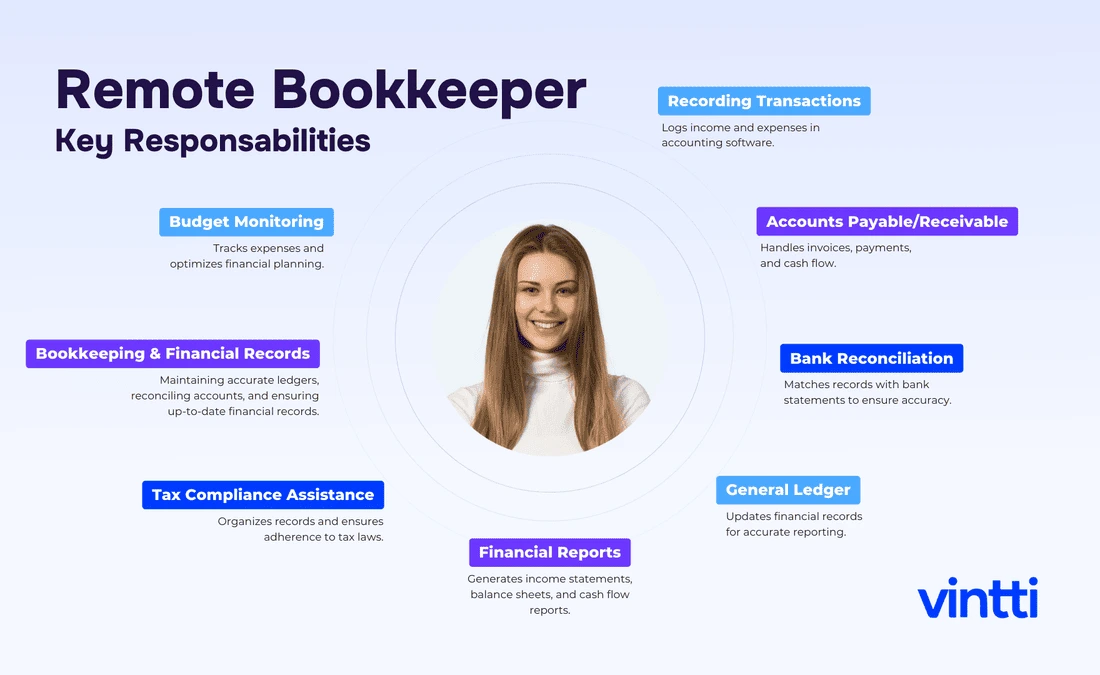















We provide accessible nearshore talent to help you build capacity within your budget.


A Bookkeeper plays a crucial role in maintaining a company's financial health by recording and managing its daily financial transactions. This role involves tasks such as processing invoices, reconciling bank statements, tracking expenses, and ensuring the accuracy of financial records. Bookkeepers keep an organization's accounts in order, providing valuable insights through financial reports and data, which helps in making informed business decisions. They collaborate with accountants and other financial professionals to ensure compliance with financial regulations and to support the overall financial management of the organization.
A remote bookkeeper manages financial records, transactions, and reports for a company while working remotely. They handle accounts payable and receivable, maintain ledgers, and oversee budgeting and forecasting. By outsourcing bookkeeping, businesses save time and focus on growth.
Some remote bookkeepers are freelancers, while others are full-time employees. Many companies hire internationally to reduce costs while maintaining efficiency. Despite working remotely, they integrate seamlessly into company operations.
Hiring offshore bookkeepers helps businesses cut costs while maintaining quality. A staffing agency streamlines recruitment, ensuring a seamless hiring process in just two weeks. Partnering with experts simplifies hiring, letting businesses focus on operations while securing top bookkeeping talent
.
Bookkeepers are responsible for maintaining accurate financial records and ensuring the smooth operation of financial processes within an organization. They meticulously record all financial transactions, including purchases, sales, and other payments, in accounting software or ledgers. This also involves preparing and processing invoices, reconciling bank statements to ensure consistency and accuracy, and tracking expenses to manage cash flow effectively. Moreover, bookkeepers handle payroll processing, ensuring employees are paid correctly and on time, while also managing related tax deductions and benefits administration.
In addition to maintaining daily financial records, bookkeepers generate financial reports that offer valuable insights into the company’s financial status. They analyze financial data to assist in budget preparation, forecasting, and to support strategic business decisions. By maintaining organized and up-to-date records, bookkeepers play a key role in preparing for audits and ensuring compliance with relevant financial regulations and standards. They work closely with accountants and other financial professionals to provide accurate financial information, facilitate smooth end-of-year closings, and support the overall financial health of the organization.

Ideal candidates for a bookkeeper role often possess foundational education in accounting, finance, or a related field, typically attained through an associate degree or post-secondary coursework. Professional certifications such as the Certified Bookkeeper (CB) from the American Institute of Professional Bookkeepers (AIPB) or the Certified Public Bookkeeper (CPB) from the National Association of Certified Public Bookkeepers (NACPB) can significantly enhance a bookkeeper’s credentials. Additionally, proficiency with accounting software like QuickBooks, Xero, or similar tools is essential, as is a strong understanding of Generally Accepted Accounting Principles (GAAP) and relevant local financial regulations. Continuous professional development through workshops, courses, and staying updated with industry trends is also highly beneficial.
Salaries shown are estimates. Actual savings may be even greater. Please schedule a consultation to receive detailed information tailored to your needs.
In an entry-level bookkeeping role, juniors focus on recording daily financial transactions, processing invoices, and assisting with bank reconciliations. They work under close supervision, learning accounting software and ensuring accuracy in basic data entry tasks.
Semi-senior bookkeepers handle a wider range of bookkeeping duties, from maintaining the general ledger to preparing preliminary financial reports. They resolve discrepancies, manage accounts payable/receivable, and work more independently while ensuring compliance with company policies.
Senior bookkeepers oversee all day-to-day financial recordkeeping activities, review the accuracy of entries, and prepare month-end closing reports. They may supervise junior staff, liaise with accountants for audits, and ensure adherence to accounting standards.
A bookkeeping manager leads the bookkeeping team, implements process improvements, and ensures timely, accurate maintenance of financial records. They coordinate with accountants, department heads, and auditors to support financial reporting and compliance.
Do you want hire fast?
See how we can help you find a perfect match in only 20 days.
Do you want hire fast?
See how we can help you find a perfect match in only 20 days.
Build a remote team that works just for you. Interview candidates for free, and pay only if you hire.
60%
Reduce your staffing expenses significantly while maintaining top-tier talent.
100%
Ensure seamless collaboration with perfectly matched time zone coverage
18 days
Accelerate your recruitment process and fill positions faster than ever before.






.svg.webp)























You can secure high-quality South American talent in just 20 days and for around $9,000 USD per year.
Start Hiring